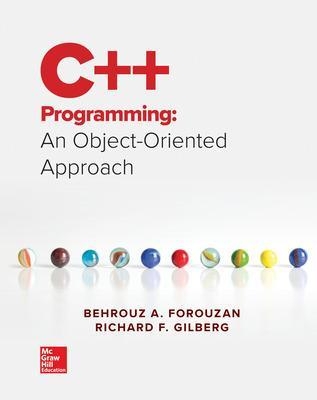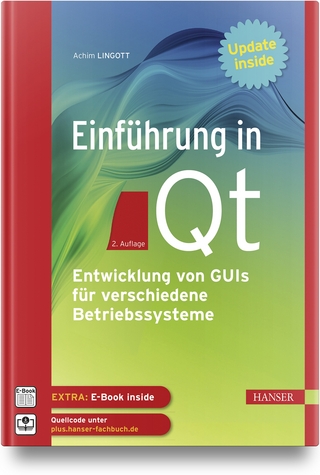
C++ Programming: An Object-Oriented Approach
McGraw Hill Higher Education (Verlag)
978-0-07-352338-5 (ISBN)
C++ Programming: An Object-Oriented Approach has two primary objectives: Teach the basic principles of programming as outlined in the ACM curriculum for a CS1 class and teach the basic constructs of the C++ language. While C++ is a complex and professional language, experience shows that beginning students can easily understand and use C++.
C++ Programming: An Object-Oriented Approach uses a combination of thorough, well-ordered explanations and a strong visual framework to make programming concepts accessible to students. The authors stress incremental program development, wherein program analysis is followed by building a structure chart, constructing UML flow diagrams, writing algorithms, undertaking program design, and finally testing. This foundation, combined with a focus on the benefits of a consistent and well-documented programming style, prepares students to tackle the academic and professional programming challenges they will encounter down the road with confidence.
Behrouz A. Forouzan is a Professor at DeAnza College where he is involved in the development of Computer Information System courses. In addition he provides system development consulting with several companies. In addition to C and C++ books, Forouzan is the author of several other successful books, including Computer Networks: A Top-Down Approach, TCP/IP Protocol Suite, and Local Area Networks. Richard F. Gilberg is a retired Professor of Computer Science from DeAnza College where his classes were primarily in computer programming, data structures, and web site development. Prior to joining DeAnza College, Mr. Gilberg worked for a large aerospace company as a programmer, analyst, and manager. He has co-authored six computer science textbooks with Mr. Forouzan.
Chapter 1: Introduction to Computers and Programming LanguagesChapter 2: Basics of C++ ProgrammingChapter 3: Expressions and StatementsChapter 4: SelectionChapter 5: RepetitionChapter 6: FunctionsChapter 7: User-Defined Types: ClassesChapter 8: ArraysChapter 9: References, Pointers, and Memory ManagementChapter 10: StringsChapter 11: Relationships among ClassesChapter 12: Polymorphism and Other IssuesChapter 13: Operator OverloadingChapter 14: Exception HandlingChapter 15: Generic Programming: TemplatesChapter 16: Input/Output StreamsChapter 17: RecursionChapter 18: Introduction to Data StructuresChapter 19: Standard Template Library (STL)
Chapter 20: Design Patterns
AppendicesAppendix A: UnicodeAppendix B: Positional Numbering SystemAppendix C: C++ Expressions and OperatorsAppendix D: Bitwise OperationsAppendix E: Bit FieldsAppendix F: PreprocessingAppendix G: NamespacesAppendix H: RatiosAppendix I: TimeAppendix J: Lambda Expressions
Appendix K: Regular Expressions
Appendix L: Smart Pointers
Appendix M: Random Number Generation
Appendix N: References
Appendix O: Move versus Copy
Appendix P: A Brief Review of C++ 11
Appendix Q: Unified Modeling Language (UML)
Appendix R: Bitset
GlossaryIndex
| Erscheint lt. Verlag | 1.3.2019 |
|---|---|
| Verlagsort | London |
| Sprache | englisch |
| Gewicht | 1687 g |
| Themenwelt | Mathematik / Informatik ► Informatik ► Programmiersprachen / -werkzeuge |
| Informatik ► Software Entwicklung ► Objektorientierung | |
| ISBN-10 | 0-07-352338-0 / 0073523380 |
| ISBN-13 | 978-0-07-352338-5 / 9780073523385 |
| Zustand | Neuware |
| Haben Sie eine Frage zum Produkt? |
aus dem Bereich


